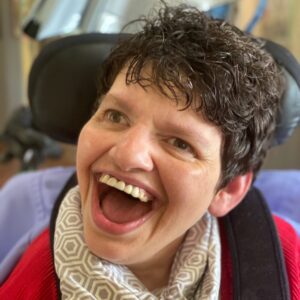 Today we are raising awareness of rare conditions such as the one my daughter Sesha has. It is PURA Syndrome, and it is a one-gene variant that has profound effects. When we recognized that something was not right with our beautiful 4-month-old baby and learned that there were lifelong difficulties, although we had no etiology, we were devastated. Sesha is now 54 years old, and little could we have imagined then the joy she would bring into our lives and the magnificent person she has developed into. Yes, all the difficulties that were prognosticated at the time are still with her. And it was not until she was 48 years old that we received her actual diagnosis of PURA Syndrome. But the long list of conditions she has does not sum up who she is, nor did the doctors give us any sense of the woman she would grow into. She was always a very happy child, full of love and delight. She has matured into a woman of great sensitivity and an extraordinary love for and understanding of music, especially classical music. She has taught me that so many philosophical dogmas I had taken for granted were missing important aspects of our lives. She has inspired me to rethink and write about these matters. She has taught me how to listen–really listen–to music. And to understand how very little we know of what happens in the minds of those labeled intellectually disabled. Sesha has a rich mental life, a rich emotional life, and a rich musical life. More so, I dare to say that most of us do. Without expressive language, I venture she has found ways to deal with pain, frustration, sadness, and other difficulties in ways most of us have not. Depriving ourselves of knowledge of people such as my daughter is depriving ourselves of knowledge of who and what we are as human beings. Sesha is a great gift to me and to all who know her. Her presence in this troubled world makes the world a more livable place.
Today we are raising awareness of rare conditions such as the one my daughter Sesha has. It is PURA Syndrome, and it is a one-gene variant that has profound effects. When we recognized that something was not right with our beautiful 4-month-old baby and learned that there were lifelong difficulties, although we had no etiology, we were devastated. Sesha is now 54 years old, and little could we have imagined then the joy she would bring into our lives and the magnificent person she has developed into. Yes, all the difficulties that were prognosticated at the time are still with her. And it was not until she was 48 years old that we received her actual diagnosis of PURA Syndrome. But the long list of conditions she has does not sum up who she is, nor did the doctors give us any sense of the woman she would grow into. She was always a very happy child, full of love and delight. She has matured into a woman of great sensitivity and an extraordinary love for and understanding of music, especially classical music. She has taught me that so many philosophical dogmas I had taken for granted were missing important aspects of our lives. She has inspired me to rethink and write about these matters. She has taught me how to listen–really listen–to music. And to understand how very little we know of what happens in the minds of those labeled intellectually disabled. Sesha has a rich mental life, a rich emotional life, and a rich musical life. More so, I dare to say that most of us do. Without expressive language, I venture she has found ways to deal with pain, frustration, sadness, and other difficulties in ways most of us have not. Depriving ourselves of knowledge of people such as my daughter is depriving ourselves of knowledge of who and what we are as human beings. Sesha is a great gift to me and to all who know her. Her presence in this troubled world makes the world a more livable place.
